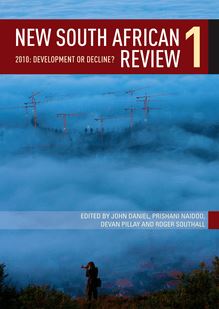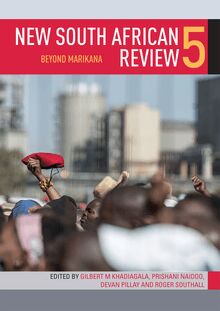New South African Review 4 , livre ebook
267
pages
English
Ebooks
2014
Vous pourrez modifier la taille du texte de cet ouvrage
Obtenez un accès à la bibliothèque pour le consulter en ligne En savoir plus
Découvre YouScribe et accède à tout notre catalogue !
Découvre YouScribe et accède à tout notre catalogue !
267
pages
English
Ebooks
2014
Vous pourrez modifier la taille du texte de cet ouvrage
Obtenez un accès à la bibliothèque pour le consulter en ligne En savoir plus
Publié par
Date de parution
01 avril 2014
Nombre de lectures
7
EAN13
9781868147977
Langue
English
Introduction: South Africa’s fragile democracy: Twenty years on - Devan Pillay and Roger Southall
Introduction to Part One - Devan Pillay
Chapter 1: The South African labour market after eighteen years: It’s class struggle, stupid! - Nicolas Pons-Vignon and Miriam Di Paola
Chapter 2: The state of organised labour: Still living like there’s no tomorrow - Ian Macun
Chapter 3: Citizen Wal-Mart? South African food retailing and selling development - Bridget Kenny
Chapter 4: Transcending South Africa’s oil dependency - Jeremy Wakeford
Chapter 5: The politics of electricity generation in South Africa - Keith Gottschalk
Introduction to Part Two - Prishani Naidoo
Chapter 6: Platinum, poverty and princes in post-apartheid South Africa: New laws, old repertoires - Aninka Claassens and Boitumelo Matlala
Chapter 7: amaDiba moment: How civil courage confronted state and corporate collusion - John GI Clarke
Chapter 8: Secrecy and power in South Africa - Dale T McKinley
Chapter 9: The contemporary relevance of Black Consciousness in South Africa -Xolela Mangcu
Chapter 10: Death and the modern black lesbian - Zethu Matebeni
Introduction to Part Three - Roger Southall
Chapter 11: Why does Zimbabwe’s school system out-perform South Africa’s? - Martin Prew
Chapter 12: Higher Education in 2013: At many crossroads - Ahmed Bawa
Chapter 13: Democracy without economic emancipation: Household relations and policy in South Africa - Sarah Mosoetsa
Chapter 14: Prisons, the law and overcrowding - Clare Ballard
Introduction to Part Four - Gilbert M Khadiagala
Chapter 15: South Africa in Africa: Groping for leadership and muddling through - Gilbert M Khadiagala
Chapter 16: South Africa and Israel: From alliance to estrangement - Ran Greenstein
Chapter 17: South Africa’s economic ties with north-east Asia - Scarlett Cornelissen
Chapter 18: Regional parastatals within South Africa’s system of accumulation - Justin van der Merwe
Chapter 19: The leadership challenge in Southern Africa - Mopeli L Moshoeshoe
NEW SOUTH AFRICAN REVIEW 4
A FRAGILE DEMOCRACY – TWENTY YEARS ON
EDITED BY GILBERT M KHADIAGALA, PRISHANI NAIDOO, DEVAN PILLAY AND ROGER SOUTHALL
Published in South Africa by:
Wits University Press
1 Jan Smuts Avenue
Johannesburg
www.witspress.co.za
Published edition © Wits University Press 2014
Compilation © Edition editors 2014
Chapters © Individual contributors 2014
First published 2014
ISBN 978-1-86814-763-2 (print)
ISBN 978-1-86814-797-7 (digital)
All rights reserved. No part of this publication may be reproduced, stored in a retrieval system, or transmitted in any form or by any means, electronic, mechanical, photocopying, recording or otherwise, without the written permission of the publisher, except in accordance with the provisions of the Copyright Act, Act 98 of 1978.
Project managed by Monica Seeber
Cover photograph © Claire McNulty
Cover design and layout by Hothouse South Africa
Printed and bound by Paarl Media, Paarl
Contents Preface ix INTRODUCTION: South Africa’s fragile democracy: Twenty years on 1 PART ONE: ECOLOGY, ECONOMY AND LABOUR 17 INTRODUCTION 18 CHAPTER 1: The South African labour market after eighteen years: It’s class struggle, stupid! 21 CHAPTER 2: The state of organised labour: Still living like there’s no tomorrow 39 CHAPTER 3: Citizen Wal-Mart? South African food retailing and selling development 56 CHAPTER 4: Transcending South Africa’s oil dependency 74 CHAPTER 5: The politics of electricity generation in South Africa 91 PART TWO: POWER, POLITICS AND PARTICIPATION 109 INTRODUCTION 110 CHAPTER 6: Platinum, poverty and princes in post-apartheid South Africa: New laws, old repertoires 113 CHAPTER 7: amaDiba moment: How civil courage confronted state and corporate collusion 136 CHAPTER 8: Secrecy and power in South Africa 150 CHAPTER 9: The contemporary relevance of Black Consciousness in South Africa 167 CHAPTER 10: Death and the modern black lesbian 182 PART THREE: PUBLIC POLICY AND SOCIAL PRACTICE 197 INTRODUCTION 198 CHAPTER 11: Why does Zimbabwe’s school system out-perform South Africa’s? 204 CHAPTER 12: Higher Education in 2013: At many crossroads 223 CHAPTER 13: Democracy without economic emancipation: Household relations and policy in South Africa 238 CHAPTER 14: Prisons, the law and overcrowding 256 PART FOUR: SOUTH AFRICA AT LARGE 271 INTRODUCTION 272 CHAPTER 15: South Africa in Africa: Groping for leadership and muddling through 275 CHAPTER 16: South Africa and Israel: From alliance to estrangement 290 CHAPTER 17: South Africa’s economic ties with north-east Asia 306 CHAPTER 18: Regional parastatals within South Africa’s system of accumulation 332 CHAPTER 19: The leadership challenge in Southern Africa 349 Contributors 364 Index 365
Preface
A Fragile Democracy – Twenty Years On, the fourth New South African Review, is one of doubtless numerous attempts to characterise the state of South Africa some two decades after those magnificent days in late April 1994 when South Africans of all colours voted for the first time in a democratic election. As we write this, we are approaching the country’s fourth such election, a significant indicator of the overall success of our democratic transition – for although there may prove to be wrinkles there is every expectation that the forthcoming contest will again be ‘free and fair’. Nonetheless, there are likely to be changes in the electoral landscape, there being significant prospect at time of writing that the ruling African National Congress’s (ANC’s) proportion of the vote will fall below 60 per cent, the level of electoral dominance it has consistently achieved hitherto. While the ANC can claim many triumphs, and can convincingly claim to have transformed South Africa for the better (materially and spiritually), there is nonetheless widespread discontent abroad. The ANC itself displays many divisions. The Tripartite Alliance (which links it to the South African Communist Party (SACP) and the Congress of South African Trade Unions (Cosatu)), is creaking; it is threatened by new opposition parties which appeal to disaffection – especially among the poor and those who feel excluded from the benefits of democracy – and even the established opposition party, the Democratic Alliance (DA) today seeks to cloak itself in the mantle of Mandela. Even while the ANC boasts about steady growth, more jobs, improved service delivery and better standards of living for the majority, critics point out that the economy is stagnating, unemployment remains stubbornly high, corruption flourishes, popular protest abounds, and government and many public services (notably the intelligence agencies and the police) have earned an alarming reputation for unaccountability. So we could go on – but we won’t, as we would rather encourage our readers to engage with the wide-ranging set of original essays provided by our authors. All we will say here is that there can be no one narrative of the achievements, disappointments and – yes – outright disasters of the last twenty years, but we are confident that, as ever, the New South African Review will add constructively and critically to the debate about where South Africa has come from and in what direction it is going.
The New South African Review remains centred in the Sociology Department at the University of the Witwatersrand, although this year the editorial team has been joined by Professor Gilbert M Khadiagala of the University’s Department of International Relations. Apart from being indebted to our many contributors, we would like to record our thanks to both the Dean of Humanities, Professor Ruksana Osman, and the Head of the School of Social Sciences, Professor Shahid Vawda, for their encouragement and provision of financial support. Ingrid Chunilall and Laura Bloem, administrators within the Department of Sociology, undertook numerous unglamorous and demanding tasks associated with the organisation of the volume with their usual good humour and efficiency. Last but not least, we owe a huge debt to the team at Wits University Press, notably Veronica Klipp, Roshan Cader and our technical editor Monica Seeber, who not only remained enthusiastic about the project but evinced enormous patience when we as editors failed to toe the line and meet deadlines.
Gilbert M Khadiagala, Prishani Naidoo, Devan Pillay and Roger Southall.
January 2014
INTRODUCTION
South Africa’s fragile democracy: Twenty years on
Devan Pillay and Roger Southall
South Africa’s fifth democratic general election takes place a few months after the passing away of the pre-eminent icon of national liberation, Nelson Mandela. His death on 5 December 2013 was greeted with a massive outpouring of grief, as millions from all sections of society – black and white, workers and capitalists, rural traditionalists and modern suburbanites, young and old, socialists and liberals – paid tribute during the week-long proceedings leading up to his funeral. It was a time of reflection and of celebration, of tears and of joy, remembering a life that embodied the hopes and dreams of millions, not only in this country, but throughout the world. Indeed, in an unprecedented show of international solidarity, world leaders from almost every nation descended on South Africa last December to hail one of the true heroes of the modern era. In keeping with his legacy of reconciliation, the leader of the capitalist West, the US president Barack Obama, shook hands with the leader of socialist Cuba, Raul Castro.
But what was Mandela’s true legacy? In many senses (as Mao Tse Tung once said in relation to the French Revolution) it’s too early to tell. The country is caught between celebrating the achievements of our democracy, and bemoaning the abject failure to eradicate poverty, unemployment and widening social inequality. Were the ‘balance of forces’ in 1994 such that a political settlement was only possible if the essentials of (predominantly white) corporate economic power and white land ownership remained intact? Or was there space to use the ‘Madiba magic’ to demand much more, if not the promise of ‘socialism’ then at least the inclusive development path envisaged by the Freedom Charter? Historians will be debating this for decades to come.
Whatever the strengths and weaknesses of Mandela’s political legacy, his personal attributes shine through, and resonate with the best in humanity – the combination of humility and steely determination to achieve one’s goals; personal integrity; the willingness to introspect, admit failures and learn from others; kindness towards other living beings and a generosity of spirit. These are the qualities towards which South Africans aspire, that oblige most people – except the lunatic fringes – to forgive whatever shortcomings this icon may have had, and to dwell on the gifts he has bestowed on the nation and the world.
With this in mind, many South Africans judge the shortcomings of those who came after Mandela as leader of the African National Congress (ANC), and of the country. Thabo Mbeki was judged too aloof and arrogant, refusing to listen to the ANC’s alliance partners and forging ahead with a disastrous HIV/AIDs policy. He was ousted by Jacob Zuma who, genial and cuddly, clearly does not have his predecessor’s grasp of policy issues and is severely tainted by his personal failings – including his social conservatism – and strong allegations of corruption. It is no wonder that members of the ANC booed whenever his face appeared on screens during the memorial service for Mandela last December. Many believe that had Mandela been younger and fitter, and served a second term as the country’s president, he would have recognised that the country’s orthodox economic path was exacerbating poverty and inequality, and corrected its course (unlike Zuma, who came to power on that promise but failed to deliver).
Nevertheless, despite the shortcomings of the ruling party and its leader it is generally accepted tha





